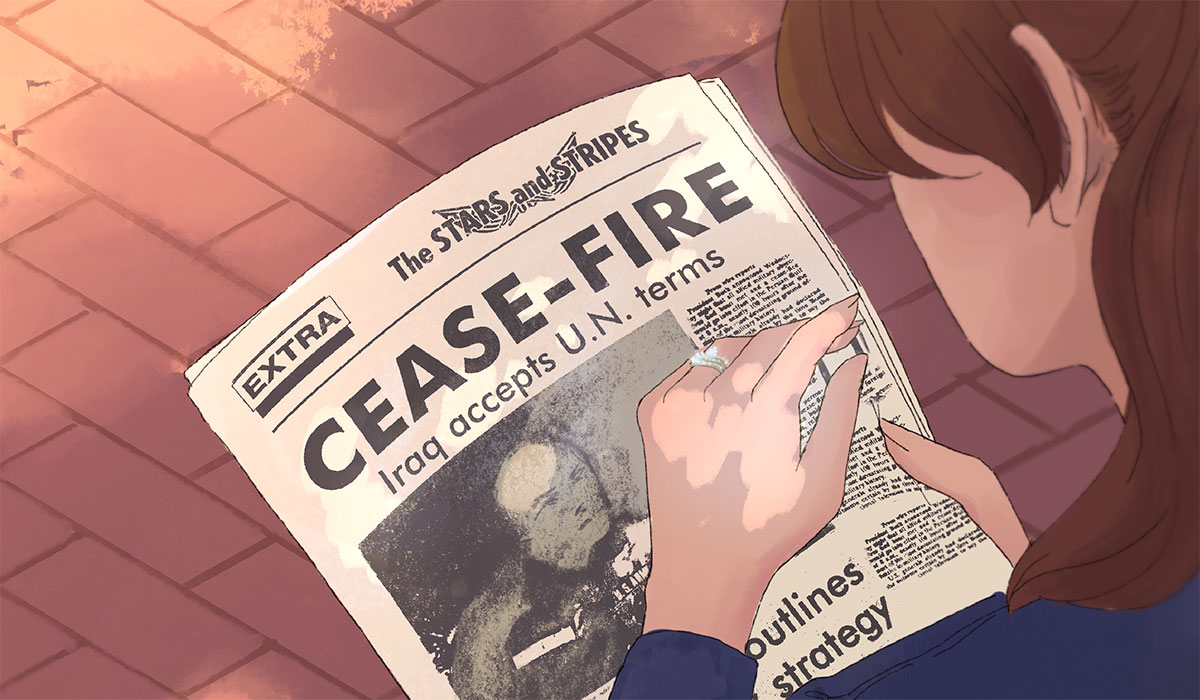I began my senior year at the University as a newlywed, having married Scott, my high school sweetheart, on Labor Day weekend 1990. We took a brief honeymoon in Ontario, Canada, through Toronto and Niagara-on-the-Lake, and then set up residence in a small town near Ann Arbor. I began my morning commutes to 8 a.m. classes without complaint, memories of antique shops and vineyards and evenings by the fire still fresh in my mind.
We had waited a long time to arrive at this point. When we parted in high school, I was leaving home to begin my stay at Michigan and Scott was bound for the U.S. Army. We continued to write and date, but it irked me that he got to visit the sites and countries that I was often studying in class. He made up for it, though, with fabulous presents: perfume from Paris, a cashmere scarf from Germany, real Belgian chocolate. I have yet to taste anything that compares.
His proposal my junior year was followed by the longest separation of all — a one-year deployment to South Korea, taking his rotation in the Demilitarized Zone. He was not allowed home, while I spent that time juggling classes and planning a wedding. I remember walking past North Hall, thinking of Scott and wondering why the ROTC candidates always conducted their exercises outside. They got laughed at a lot, which had to be difficult. Anything connected to the military seemed difficult.
Finally, Scott reached his end-of-time-served date. He was sent home, and a month later we were husband and wife. The autumn of 1990 seemed the beginning of something monumental. All of the hopes and dreams that we had been working toward for years were becoming reality.
Then it happened: the U.S.-led coalition forces reacted to Iraq’s invasion of Kuwait. Scott and I watched the events unfold on CNN in January 1991 — missile footage, played over and over again. The news was followed by a Western Union telegram indicating that Scott had received a stop-loss order and was required to report for active duty in seven days. We got our affairs together, celebrated my birthday early, and said goodbye at the airport. We had been married four months.
I cried all night and then made my regular commute to campus the next day. I got off the bus and made my way through lines of students protesting the U.S. presence in the Persian Gulf. By the time I made it to class, the tears had stopped, but I was greeted by more protestors boycotting classes. I recognized many of those faces and wanted to hit something.
I had two papers due that I did not, could not, write. Even still, I went to class and explained my situation. One professor granted me a week’s extension; another gave me all the time I needed. I listened politely to their politics and then made my way through the Diag and past the ROTC building, where the candidates were conducting drills outside. I thought every student protestor should have to spend the day watching them.
I passed through those first weeks in a fog. Then, some patches of sunlight came. An acquaintance of Scott’s heard of our situation and gave us a gift — a new invention called a cellular phone. It weighed five pounds, but I could carry it in my backpack, and Scott could contact me any time he was able, from the other side of the world. One day, as I sat eating my lunch in the Michigan Union, the phone in my backpack rang. Several curious eyes watched me receive word that for now Scott was in Germany, training, waiting for orders. I smiled for the first time in what seemed like forever.
During classes, professors and teaching assistants devoted entire lectures and discussion groups to war in general or the Gulf War in particular. I began slowly to dissect it, to see how the literature, politics, history, and social reforms that I was studying related to the real world — to me, to Scott, to all Americans.
I also learned how greatly we are connected to each other as humans. In one fragile moment, I cried a waterfall of tears on my father’s shoulder. A veteran himself, he had hoped that his sacrifice would bring a peaceful world to his children. It did not. But it brings the knowledge that all the freedoms we enjoy are created and protected by people who care enough to risk their lives.
By God’s grace, my romance has a happy ending. While Scott was stationed in Germany, waiting to be in the next wave of troops sent to the Persian Gulf, the cease-fire was declared. I still have that issue of The Stars and Stripes at the bottom of my Lane cedar chest, a wedding gift from my parents.
Scott returned home in April 1991, and on May 4 of that year, I graduated. The commencement speaker was none other than George H.W. Bush, 41st president of the United States. I’ll never forget standing in that sun-filled stadium, wearing my cap and gown and holding Scott’s hand. As I recall, I let go only long enough to wipe away tears and to applaud.
Michele Olechnowicz, ’91, and her husband celebrated their 30th wedding anniversary last September. They have two sons, the eldest of whom is currently actively serving in the U.S. Army.





